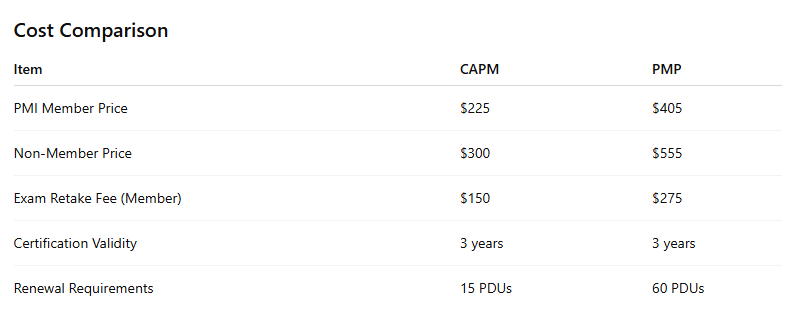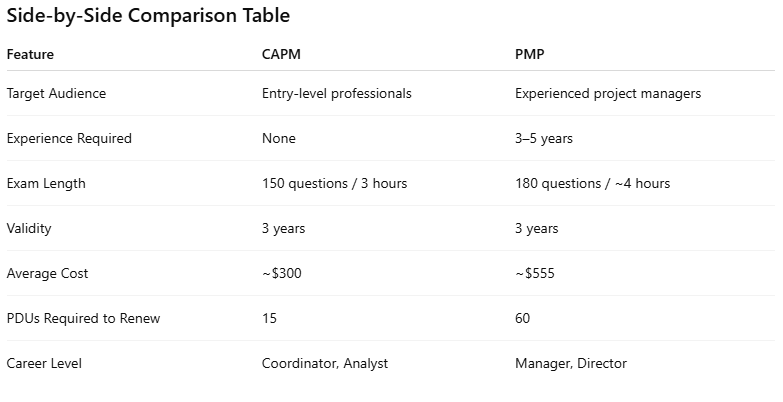

Table of Contents
Introduction
Choosing between CAPM and PMP can be a major decision for professionals looking to validate their project management skills. In this article, we compare CAPM vs PMP to help you understand the differences, advantages, costs, and career outcomes of each certification.
Understanding CAPM and PMP Certifications
The Certified Associate in Project Management (CAPM) is designed for early-career professionals who want to gain a foundational understanding of project management. It’s administered by PMI and serves as a stepping stone to more advanced roles.
The Project Management Professional (PMP) certification, also from PMI, is considered the gold standard in the industry. It validates extensive experience, leadership capabilities, and mastery of complex project management concepts.
Eligibility Requirements: CAPM vs PMP
CAPM Eligibility
-
Secondary degree (high school diploma, associate’s degree, or global equivalent)
-
23 hours of project management education (or completion of a CAPM prep course)
PMP Eligibility
-
A four-year degree
-
36 months of project leadership experience
-
35 hours of project management education or a CAPM certification
OR
-
A high school diploma or associate’s degree
-
60 months of project leadership experience
-
35 hours of project management education or a CAPM certification
Exam Structure and Difficulty
CAPM Exam
-
150 questions (including 15 pretest questions)
-
Duration: 3 hours
-
Focus: Predictive, agile, and business environment project domains
-
Based on the PMBOK® Guide and PMI’s Exam Content Outline
PMP Exam
-
180 questions (including 5 pretest questions)
-
Duration: 230 minutes
-
Focus: People, Process, and Business Environment
-
Includes situational and scenario-based questions
-
Based on multiple PMI guides including PMBOK® and Agile Practice Guide
The PMP exam is considerably more difficult, requiring not only knowledge but application of concepts in complex, real-world scenarios.
Career Impact and Salary Expectations
CAPM
-
Ideal for entry-level roles such as:
-
Project Coordinator
-
Junior Project Manager
-
Business Analyst
-
-
Average Salary (US): $55,000–$80,000 depending on role and region
PMP
-
Recognized globally for leadership roles like:
-
Senior Project Manager
-
Program Manager
-
Portfolio Manager
-
-
Average Salary (US): $110,000–$135,000
-
PMP-certified professionals earn ~20% more on average than non-certified peers
Which Certification Should You Choose?
Choose CAPM if:
-
You’re new to project management
-
You want to build credibility early in your career
-
You don’t yet meet PMP’s work experience requirements
Choose PMP if:
-
You have years of project experience
-
You’re aiming for senior or leadership roles
-
You want to maximize salary potential and job mobility
Frequently Asked Questions
-
Is PMP harder than CAPM?
Yes. PMP requires more experience and includes scenario-based questions. -
Can I take the PMP without project management experience?
No. PMP requires a specific number of hours in a leadership role on projects. -
Should I get CAPM before PMP?
Not required, but it helps satisfy PMP’s educational requirement and shows early commitment. -
Which has a better ROI, CAPM or PMP?
PMP offers a higher salary bump and broader career opportunities, making it a stronger long-term investment. -
Are both certifications recognized globally?
Yes. Both are offered by PMI and respected internationally.
Conclusion
When comparing CAPM vs PMP, the right choice depends on your career stage, goals, and experience level. CAPM is perfect for those beginning their journey in project management, while PMP opens doors to higher-paying, leadership-oriented roles. Whichever path you choose, both certifications demonstrate your commitment to the profession and can significantly boost your project management career.
Sign-up for a 7-day free trial! Try the first two modules of Brain Sensei’s story-based PMP and CAPM Exam Prep courses and a mini practice exam and see how it all works




